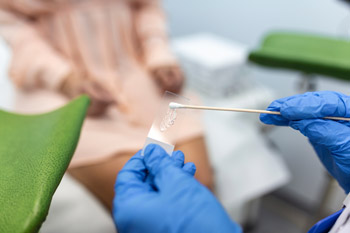Saving Lives with a Smear: The Importance of the Pap Test
by Abigail Pleiss
September 2024
Cancer is the second most common cause of death in North Dakota, ranking only after heart disease, according to the North Dakota Department of Health. Cervical cancer, a cancer of the opening part of the womb, kills about five North Dakota women each year. It often doesn't have symptoms, and someone may not know they have it until it spreads. However, it's one of the cancers that can be prevented or effectively treated if caught early which is why it's important to be familiar with routine screening.
 Screening is a type of
test that helps with early detection of many medical
conditions. For cervical cancer, screening is done with
the Pap smear, a test that uses a small brush to collect
cells from the surface of the cervix. The cells are then
sent to a lab to be looked at under a microscope. Another
part of this screening may involve testing those same
cells for a virus, the human papillomavirus (HPV). This
virus can cause a silent infection and over time may
trigger cervical cancer. Special testing for more
dangerous types of HPV can tell a health care provider if
a woman may be at higher risk for cancer.
Screening is a type of
test that helps with early detection of many medical
conditions. For cervical cancer, screening is done with
the Pap smear, a test that uses a small brush to collect
cells from the surface of the cervix. The cells are then
sent to a lab to be looked at under a microscope. Another
part of this screening may involve testing those same
cells for a virus, the human papillomavirus (HPV). This
virus can cause a silent infection and over time may
trigger cervical cancer. Special testing for more
dangerous types of HPV can tell a health care provider if
a woman may be at higher risk for cancer.
An abnormal result for either of these tests doesn't necessarily mean someone has cervical cancer. Instead, cells might just be showing pre-cancer changes. In this case, follow-up tests may be needed. One follow-up test is called a colposcopy, a test that looks at the cervix more closely using a magnifying lens.
Some women are unsure when their Pap test should be done. Talking to a healthcare provider can answer that question. The current recommendations for cervical cancer screening depend on a woman's age. According to the Unites States Preventive Services Task Force as well as the American College of Obstetricians and Gynecologists, women aged 21 to 29 should receive a Pap smear every three years. Women aged 30 to 65 can get either a Pap smear along with HPV testing every five years or continue the Pap smear alone every three years. If any abnormalities are seen on the tests, a woman may need more frequent testing.
The Pap smear can be done by a primary care doctor as part of a woman's complete checkup. It can be helpful to talk to a provider if there are questions or concerns about the test because regular Pap smears are important to prevent cervical cancer. Knowing more about the screening process and reasons to do a Pap smear can empower women to discuss their personal screening status with their healthcare provider.
About the Author
 Abigail Pleiss is a fourth-year medical student at
the University of North Dakota School of Medicine &
Health Sciences. After her clinical experiences in
Jamestown, Pleiss chose to participate in the Targeted
Rural Health Education (TRHE) project, a project focusing
on teaching student doctors how to partner with rural
newspapers to share health information. The information
provided is not for diagnosis or treatment and should not
be used in place of previous medical advice provided by a
licensed healthcare professional.
Abigail Pleiss is a fourth-year medical student at
the University of North Dakota School of Medicine &
Health Sciences. After her clinical experiences in
Jamestown, Pleiss chose to participate in the Targeted
Rural Health Education (TRHE) project, a project focusing
on teaching student doctors how to partner with rural
newspapers to share health information. The information
provided is not for diagnosis or treatment and should not
be used in place of previous medical advice provided by a
licensed healthcare professional.
